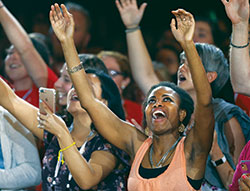Pope invites people to share views on young people, vocations

Young people lift their arms in prayer as Catholic musician Matt Maher performs on July 3 during the “Convocation of Catholic Leaders: The Joy of the Gospel in America” in Orlando, Fla. Leaders from dioceses and various Catholic organizations gathered for the July 1-4 convocation. (CNS photo/Bob Roller)
By John Shaughnessy
Consider it a heartfelt invitation from Pope Francis.
The pope has extended the invitation as the Church prepares for a meeting of the Synod of Bishops on young people, the faith and vocational discernment in October 2018.
In a letter to young people earlier this year, Pope Francis noted, “The Church wishes to listen to your voice, your sensitivities and your faith, even your doubts and your criticism. Make your voice heard, let it resonate in communities, and let it be heard by your shepherds of souls.”
As part of that invitation, young people—and actually all Catholics and non-Catholics—are asked to share their thoughts on a survey that is available in the archdiocese through the website, www.archindy.org/listens.
The opportunity for people to share their responses to the survey’s questions about “young people, the faith and vocational discernment” will be available until July 31.
Four surveys have been created, each individually designed to be answered by youths, young adults, priests and all other people. (More info here)
“There’s an old saying, ‘Feedback is the breakfast of champions,’ ” says Ken Ogorek, director of catechesis for the archdiocese who will be involved in processing the results of the surveys from members of the Church in central and southern Indiana.
“This is Church leadership at the highest levels saying, ‘We want your feedback, we want your input. We’re in a sense willing to be vulnerable and ask very open-ended questions, and we want to hear what you have to say about God, about faith, about the Church, about the culture you’re living in.’ ”
Ogorek believes that Pope Francis’ invitation for young people to share their thoughts and insights reflects the pope’s desire to give youths an opportunity that they don’t often have in the modern world—the opportunity to be heard.
“He’s pointing out that young people aren’t the future Church or the Church of the future. Young people are part of the Church today,” Ogorek says. “There are challenges, generally speaking, in our modern culture. It’s difficult for some people to feel they’re really being heard in an authentically human way.
“I think what Pope Francis is saying, to young people especially, is ‘Your thoughts matter, and the Church loves you. And as a part of the relationship that we want all people to have with the Body of Christ, we want to listen as well as fulfill our responsibility to teach.’ ”
Information from the surveys will be compiled at the archdiocesan level, Ogorek notes. In compiling the responses, members of the archdiocesan staff will be looking “to get the gist of the patterns and trends in the replies”—all with the goal of trying to “capture the spirit of what people are feeling and thinking.”
Archbishop-designate Charles C. Thompson will then have the opportunity to share the results of the surveys from the archdiocese with the U.S. Conference of Catholic Bishops. There, the information will become part of the conference’s contribution to the Synod of Bishops that will meet at the Vatican in October of 2018.
That desire to get feedback from the faithful reflects the history of synods in the Church, Ogorek says.
“Pope Francis is following in a long line of Holy Fathers who have convened these regular synods and tried to find ways for the faithful to weigh in and be involved in the conversation,” Ogorek says.
“In addition to teaching, which is part of her responsibility, the Church really does want to listen. Processes like these are great opportunities for the faithful to make their voice heard.” †
